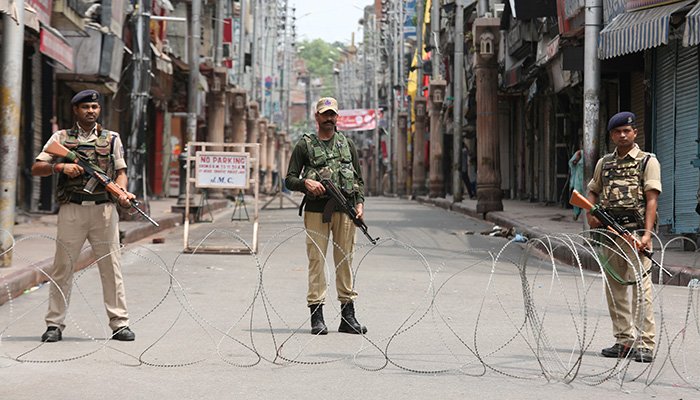OIC’s human rights body says systematic violations in IoK tantamount to genocide
November 29, 2019

Organisation of Islamic Cooperation's (OIC) Independent Permanent Human Rights Commission (IPHRC) on Friday condemned New Delhi for its ongoing human rights violations in Indian occupied Kashmir (IoK), and said the systematic violations have a well-defined pattern that tantamount to ethnic cleansing and genocide of Kashmiris.
According to a press release, the commission held an open meeting to review the worsening human rights situation in the occupied valley during its recently concluded 16th Session in Jeddah. The meeting was attended by all commission members and a large number of representatives of the OIC member and observer states.
“The Commission was appalled to note that the Indian Government in an attempt to quell the Kashmiris struggle for the right to self-determination, has resorted to relentless political, economic and communication blockade in IoK, which has completed more than 115 days with no sign of letting up in sight,” the statement said.
The body said that since August 5, the Indian government’s deployment of over half a million security personnel in the disputed territory has “practically turned IoK into the biggest open prison”.
The commission reiterated that India’s move to abrogate Articles 35A and 370 was illegal and void. The OIC’s body also stated that the move aims to change the “demographic composition of IoK” by making the occupied Muslim population a minority within their homeland.
The commission stated that the move was a clear violation of the relevant human rights treaties and conventions and Articles 27 and 49 of the Fourth Geneva Convention, its Additional Protocol.
IPHRC also strongly condemned the continued use of pellet guns, use of arbitrary arrests and extrajudicial killings, as well as targeting of both the religious and political leadership of Kashmiris under fabricated charges.
The commission stated, “These systematic and systemic human rights violations have a well-defined pattern that tantamount to ethnic cleansing and genocide of Kashmiris, which falls under the definition of the most serious crimes of concern to the international community.”
The IPHRC also endorsed the UN high commissioner for human rights recommendation to establish an inquiry commission to comprehensively investigate all the allegations of human rights violations.
During the meeting, Azad Jammu and Kashmir (AJK) President Masood Khan also briefed the meeting on the ongoing grave human rights situation in the IoK and drew attention of the international community to act in earnest to avert an impending genocide and humanitarian crisis.
Khan welcomed the “objective and principled pronouncements” of the OIC and IPHRC on the plight of Kashmiri Muslims. He also extended an invitation to IPHRC to undertake another visit to AJK to update the findings of its earlier report of 2017 on the subject.
During the meeting the commission also agreed to visit to AJK and meet refugees, political parties and other civil society representatives from the IoK to determine the situation on ground, update its earlier report of 2017 of the subject and share its findings with the Council of Foreign Ministers.
The commission also agreed to conduct an independent case study on the “use of pellet guns in IoK by the Indian security forces against peaceful protesters including women and children”.
The commission demanded the Indian government to put an immediate end to the ongoing human rights violations in IoK and lift the “inhuman” curfew. It also urged New Delhi to restore all fundamental freedoms of Kashmiris and repeal its discriminatory laws like Armed Forces Special Power Act. It also called Indian to provide access to the fact-finding missions of the United Nations, OIC and OIC-IPHRC.
IPHRC also called New Delhi to allow OIC and International Committee of the Red Cross to establish a “humanitarian corridor” in IoK to reach out to the besieged population for provision of basic food and medical supplies. The body also called India to implement relevant UN resolutions to allow the Kashmiris to exercise their right to self-determination through a free and fair plebiscite.
The commission also urged the UN and international community to pressurise India to take early and concrete steps in this regard.











